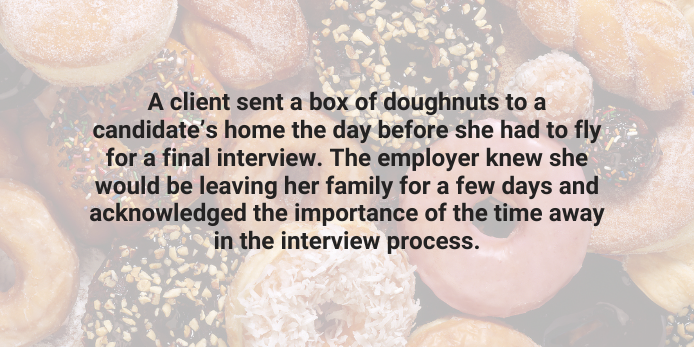
“The customer is always right.” As consumers, we often feel prioritized. Without customers buying products and services, businesses can’t survive. Without a committed and engaged workforce, organizations can struggle to deliver to its customers. However, consumers and job candidates are often treated very differently by organizations.
Following a year that redefined how we work, socialize, and engage with our community, companies that take the right approach to treating candidates and employees like consumers significantly increase their chances of finding the top talent for their organization and retaining them.
Candidates and Employees are Consumers – They Have Choices
As the shortage of skilled workers continues to grow along with the already cutthroat competition for top talent, the power dynamic between companies and their people has shifted decidedly from employer to employee. Employees expect their needs to be met at work.
People looking for jobs not only have more choices, but they also possess more information about companies, making them much more discriminating when choosing potential employers. Just as online shopping has changed the way people purchase merchandise, the internet has given job seekers easy access to detailed information about companies through sources such as online reviews, best workplace lists, and social media such as LinkedIn (2).
As Dr. Peter Cappelli of the Wharton School of Business once noted, “employees today are consumers of work – and like all consumers, they have a choice.”
Re-Define the Recruitment Process
The combination of candidate and consumer preferences has created a new type of worker, best described as a “TalentSumer.” Candidates want to be made a priority during the process. How you treat them before they’re hired reflects what you’d be like as an employer. A poor candidate experience can spread quickly among professional networks and hurt your chances of engaging talent at all. Much like the customer experience concept in marketing, the recruitment process can be split up into three stages: the awareness stage, the consideration stage and the decision-making stage.

Reaching the Right Candidate
Organizations must promote the value they offer and articulate a “why buy” message in new ways that attract employees who are shopping for jobs. Every organization should have a unique Employee Value Proposition (EVP) to demonstrate to prospective employees what they can expect and look forward to once they are hired.
Your job posts should include compelling messaging that excites potential employees about the opportunity and company. The information you distribute is relevant for your target audience and choosing your recruitment channels wisely, picking multiple that lead to the platforms (like job boards, social media, and communities) where your target audience is present. On average, candidates have encountered 10 or more online touch points before they apply for a job. Touchpoints being moments a potential candidate is confronted with your company.
Consideration Stage
Keep the process simple. Just as your company wants to make it easy for a customer to have a good buying experience, simplifying the application process goes a long way to favorably impact candidate perception of your hiring process. An interview process is an opportunity for candidates to experience what it will be like to be a part of your business. Creating a positive image by greeting candidates with a smile, encouraging their questions and promoting career opportunities can be the difference between an accepted and a rejected job offer
It’s also important be transparent about the entire application and hiring process. One of the most common factors contributing to a negative candidate experience is lack of communication. 60% of job hunters will look at alternative options if they are left waiting too long to hear back about the next stage of the recruitment process. Companies make it a practice to respond to customers in a timely manner and should be communicating just as consistently with job seekers to prevent quality candidates from slipping away.
Decision Stage
Feedback is another important component of the recruitment and hiring process with candidates. According to the Human Capital Institute, “Ninety-four percent of job seekers want interview feedback, and job seekers are four times more likely to consider a company for a future opportunity when they receive constructive feedback.” On the flip side, provide opportunities for candidates to provide feedback to utilize as you continue to improve your recruitment and hiring process to give your company a competitive edge for attracting top talent.
Candidates who have a great overall experience throughout a company’s recruitment process are more likely to apply again, refer others, and buy products and/or services. Therefore, the candidate experience has an impact well beyond Human Resources, directly influencing company brand and profitability. Do you attract the best talent by delivering an exceptional recruitment experience with the “TalentSumer” mindset? Get connected with our team of subject matter experts to start improving your hiring strategies today.





